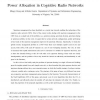Free Online Productivity Tools
i2Speak
i2Symbol
i2OCR
iTex2Img
iWeb2Print
iWeb2Shot
i2Type
iPdf2Split
iPdf2Merge
i2Bopomofo
i2Arabic
i2Style
i2Image
i2PDF
iLatex2Rtf
Sci2ools
CORR
2011
Springer
2011
Springer
Joint Distributed Access Point Selection and Power Allocation in Cognitive Radio Networks
Spectrum management has been identified as a crucial step towards enabling the technology of the cognitive radio network (CRN). Most of the current works dealing with spectrum management in the CRN focus on a single task of the problem, e.g., spectrum sensing, spectrum decision, spectrum sharing or spectrum mobility. In this work, we argue that for certain network configurations, jointly performing several tasks of the spectrum management improves the spectrum efficiency. Specifically, we study the uplink resource management problem in a CRN where there exist multiple cognitive users (CUs) and access points (APs), with each AP operates on a set of non-overlapping channels. The CUs, in order to maximize their uplink transmission rates, have to associate to a suitable AP (spectrum decision), and to share the channels belong to this AP with other CUs (spectrum sharing). These tasks are clearly interdependent, and the problem of how they should be carried out efficiently and distribu...
Related Content
| Added | 13 May 2011 |
| Updated | 13 May 2011 |
| Type | Journal |
| Year | 2011 |
| Where | CORR |
| Authors | Mingyi Hong, Alfredo Garcia, Jorge Alviar |
Comments (0)

